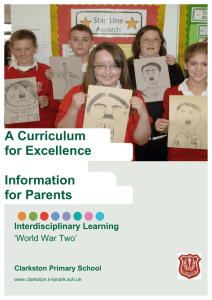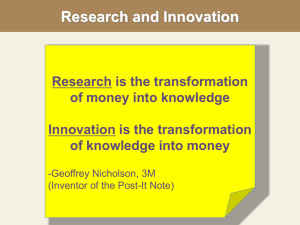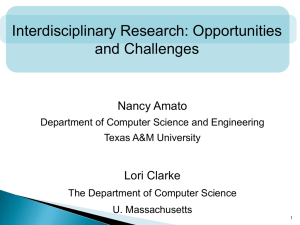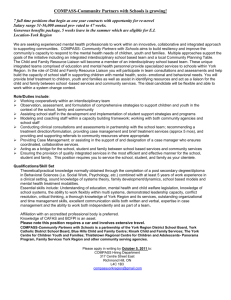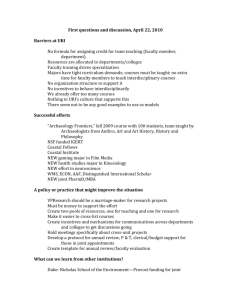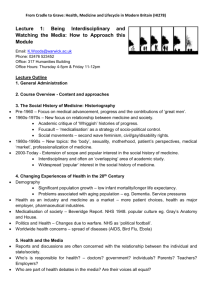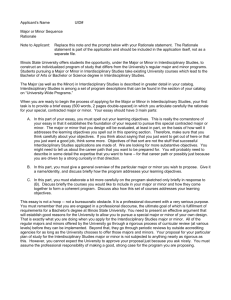faculty assembly - College of Design
advertisement
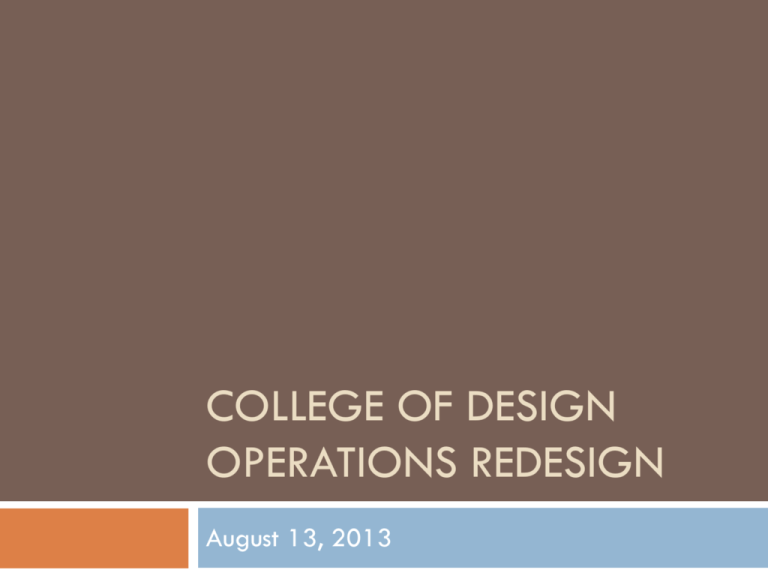
COLLEGE OF DESIGN OPERATIONS REDESIGN August 13, 2013 The case for Operations redesign Meet growing and changing needs of faculty and staff Accommodate new programs and initiatives Accommodate ebbs and flows of enrollment and support needs Respond to Eric Kaler’s call for operational excellence Control our own destiny This is how we are structured…. But this is how we work…… Our approach The “how to” manual *predetermined plan *predetermined outcome *clear, but rigid The “yet to be written” manual *collective plan *no predetermined outcome *messy, but flexible Goal of CDES Ops Redesign is to… By October 1, CDES Operations will have defined our new organizational structure, culture and work processes that enable CDES to meet its vision of an integrated, flexible and student centered College. Based on an Appreciative foundation, we will apply Design Thinking to the work that we do and how we do it. Discovery of what works well Discover Implementation of the proposed design around what works Destiny/ Deliver Appreciative Inquiry Map Design Plan & prioritize processes that would work well Dream Envisioning what would work well in the future Design Thinking mindsets Embracing diversity in all forms Radical collaboration Making things visible Working with empathy for the user Having creative confidence Having a bias for action Being open to failing forward Committing to iterative action Key milestone dates Discovery 1. Determine the best of “what is” Culture, outcomes and workflows 2. April/May Dream June/July Determine what “could be” Culture, outcomes and workflows 3. Design 4. Plan and prioritize what will work well Destiny August/September October Prepare to “Go Live” Workflow process teams Hiring and assigning graduate students Faculty support Curriculum management Supporting and promoting research and outreach Student communication Supporting and integrating new interdisciplinary initiatives From the perspective of… Students Staff Faculty Alumni Teams in action Teams in action Teams in action Team Leaders: Martha McDonell and Carrie Vigen Team Members: Melodie Bard, Nancy Galas, Katie Leonard, and Tisha VanHaaften Discovery Phase Department Hiring Authority Survey Current CDes Graduate Student TA/RA Survey Process Mapping Dream Phase Asked departments for more information about current application/hiring processes/templates Brainstormed/Big Picture Metaphor: “Open Picnic Grounds” ▪ ALL CDes graduate students have access to information/hiring processes for ALL CDes graduate TA/RA positions, including development of Interdisciplinary TA/RA opportunities Dream Phase (continued) Modified current process map to suggest three new paths/options (see website): ▪ 1.) Small: Each department communicates their TA/RA openings to all their students (more transparency) ▪ 2.) Creative: In addition to above, add college-wide Interdisciplinary TA/RA opportunities (open to all CDes students) ▪ 3.) Overhaul: Complete merger/centralization of process to a college-wide assignment/hiring process with a hiring committee, includes communication of all positions and addition of Interdisciplinary opportunities 1.) Increased transparency/ communication/access regarding available CDes graduate TA/RA positions (within the departments and/or college-wide) 2.) Addition of Interdisciplinary TA/RA opportunities, open to all CDes graduate students “Central Broadcast Tower” Based on survey results, our current processes are working well, from the prospective of both current graduate student TA/RA and the department hiring authorities Suggestions by Interdisciplinary Process Team could naturally lead to Interdisciplinary TA/RA opportunities (college-wide intro drawing course) Do departments want/are they willing to allow as much transparency as the students want? What/where/how is the best way to introduce an Interdisciplinary TA/RA opportunity? How would Interdisciplinary TA/RA positions be funded (to allow for cross department cost-sharing; college fund)? Team Leaders: Warren Bruland & Constance Severson Team Members: Michelle Belmont, Corrie Bozung, Ebony Chunn, Sara Grothe, Kathy Guiney, Clay Kimber, Ella Stallings, Julieann Swanson, Tim Walters Discovery 1. We found that “Faculty Support” is very broad and hard to define. 2. We re-named the group “Faculty Teaching Support.” 3. Improving Communication is key. 4. Faculty Surveys were conducted. Improve communication by reducing hierarchy between employment groups 1. 2. 3. Informational meeting for all staff and faculty at the beginning of the school year to promote best practices. New employee orientation at the College/Department level. Move everyone to Universal use of google calendar Information Meeting at the beginning of the school year for all staff and faculty to promote best practices throughout the college. U CDes Dept. Breakout Sessions • Arch/LA/DHA • Specific Issues CDes Presenters: IT, Finance, HR, ER Academic Resources Departments/Units Programs If necessary Information Meeting University CDes (all employees meet together) ◦ IT ◦ Finance ◦ Academic resources, etc. Departments (breakout sessions) ◦ Teaching Specific Moodle Classroom/resource scheduling Grades Website, etc. Programs (if necessary) New Employee Orientation Broader Issues related to University Employment. One-time only at beginning of employment. Not teaching Specific. Includes policies and procedures specific to CDes and Departments Universal use of Google calendar Many of the groups dreams/challenges were similar to ours. Better Communication became the central theme. People seem to be interested in getting to know others in the College in more social settings. Being housed in the same building or at least on the same campus is still an important goal. Faculty buy-in. Top down support will be necessary. Important to keep the momentum of this process going among staff. Working with talented diverse personalities can be challenging. Team Leaders: Stephanie Dilworth and Lin Nelson-Mayson Team Members: Tara Faricy, Cheryl Johnson, Holley Locher, Lucy Reile, Theresa Tichich, Inga Theissen, Amanda Underwood, Gayle Whitney The Interdisciplinary Team developed two surveys on existing interdisciplinary activities – one for faculty/staff and one for students. Student Survey (15 UG + 16 G respondents) Definition Interdisciplinary activities are a broad, flexible view of learning More than one CDes program involved More than one college involved Class not in student’s home program Outside of classroom experience Organized student groups UROP or study abroad experiences Key Findings Respondents want more class time with students of other majors (in CDes and other colleges) Minors are seen as adding interdisciplinary content Independent experiences can prepare for interdisciplinary activities Interdisciplinary activities are available primarily by taking classes outside of CDes Interdisciplinary experiences are self-initiated, not promoted by faculty Comments I'm excited to have other opportunities to learn in interdisciplinary courses and opportunities. Even if this survey doesn't result in any changes to offered courses, I will continue like I always have; enjoying the vast opportunity nestled in a big university. (UG) We often hear the college talk about how important interdisciplinary work is to our field so it would be awesome if the studios or other classes could actually incorporate that into the curriculum. (UG) Most interdisciplinary opportunities are self-initiated by students with their electives. (G) Faculty & Staff Survey (49 respondents) Definition Interdisciplinary activities explore common connections Co-teaching with faculty from multiple CDes departments or multiple colleges Research with faculty from multiple CDes departments or multiple colleges Research with faculty from other academic institutions Involved with community organizations Key Findings Responses covered the full spectrum from involved to not involved; supported to not supported Programs are not constructed to facilitate interdisciplinary activities A high number of respondents (41 of 49) self-identified as involved in interdisciplinary activities Respondents report being positively involved in interdisciplinary activities Comments I feel that I do not know a lot about the interdisciplinary work done in CDes. Many times I feel alone in that sense. We could be doing a better job starting dialogues around this uses and spreading awareness around all that is done. (faculty) I think design is increasingly viewed as a useful and important partner by other non-design fields, and design – with its lateral way of thinking and working – is inherently interdisciplinary in nature. We should be good at this. (admin/faculty) Conclusions CDes sends a stronger message of interdisciplinary activities within the college than students discover The majority of respondents want more interdisciplinary opportunities Students outside of CDes see CDes courses as interdisciplinary Start with existing CDes programs to increase interdisciplinary activities within the college The team focused attention on Interdisciplinary Curriculum and Extra Curricular Opportunities Why is this important? Give our students a well-rounded design education Make our program unique Bring in more students Scenario 1 Scenario 2 Scenario 3 Design Major Creating a Major that combines elements from all the disciplines Joint Foundational Courses Get rid of multiple intro courses that cover the same material Design Challenges: Design challenges: External Co-Courses Develop courses with other colleges that relate to real-world work Do employers want this? Do students want this? Would students be marketable? Is this change too high level? Faculty buy-in Accreditation & licensing Finding content Developing new classes Will this bring in money from outside the college? Time frame - at least 4 years out Making sure it meets program requirements for all disciplines Don’t want to add to students cost or workload Territoriality between faculty How will money be split among departments Do we already have overlapping content? What courses should we require? Required social event (like a research slam)? Community-based project Study Abroad programs Location - both Rapson & McNeal? Design Challenges: Funding across colleges (tuition split) Meets program requirements for all disciplines Don’t want to add to students cost or workload Territoriality How might we go about opening a program to other disciplines? The team proposed the development of a professional design major that would complement the academic programs by adding leadership and entrepreneurial content necessary for a student to achieve success. Faculty and students see interdisciplinary activities differently. Faculty members see interdisciplinary activities as those that explore common connections across departments, colleges, community organizations, or other academic institutions. Students see interdisciplinary activities as a broad, flexible way of learning that includes more than one CDes program or college, a class not in the student’s home program, or activities outside the classroom The direction that the dream and design phases took us resulted in an academic decision that could only be addressed by the faculty, so was not an appropriate solution to supporting interdisciplinary activities. However, returning to the responses received in our original survey, we recognized that there were two misperceptions were uncovered and a possible direction suggested: That the importance of interdisciplinarity was part of the CDes mission/vision/values statements. That, even with the two definitions of interdisciplinarity, it was unclear to both sets of stakeholders what was actually taking place and what opportunities existed to participate. The resulting proposal for Supporting and Integrating New Interdisciplinary Initiatives is to name, acknowledge, and celebrate interdisciplinary activities. Identifying activities, classes, research, and events as interdisciplinary activities draws attention to the partnerships involved and to the richness of CDes’ encouragement for this type of experience. By their nature, interdisciplinary activities are hard to classify. Identifying this wealth of experiences as interdisciplinary allows the college and community to view them as contributing to diverse and innovative learning and service. PERCEPTION OF INTERDISCIPLINARY ACTIVITIES IMPORTANT TO THE COLLEGE (yes) STATED IN THE COLLEGE MISSION (no) VERY LITTLE TO NOTHING IS HAPPENING (actually, quite a lot is!) PROPOSAL IDENTIFY WHAT ARE WE CURRENTLY DOING <===> WHAT IS ITS RELATIONSHIP TO OUR COLLEGE MISSION/VISION CALL OUT AND PROMOTE (COMMUNICATE) <===> NAMING+ACKNOWLEDGEMENT = VALUE ISSSUES DIFFERING DEFINITIONS – IS THERE A NEED TO SPECIFY WHAT IS INTERDISCIPLINARY OR DOES A “BIG TENT” APPROACH ACKNOWLEDGE THE VARIETY OF THESE ACTIVITIES? SUCCESS - HOW DO WE KNOW WE HAVE SUCEEDED? WHAT IS MEASURED? Team Leaders: Joline Brink and Terry Rafferty Team Members: Wanda Loerch, Jennifer Peterson, Matt Thoen, Chris Schlichting, Jeanne Schacht, Mary Vincent Franco, Lori Swenson, Peter Crandall, Katrina Thompson STUDENT COMMUNICATIONS Dream: to improve face-to-face and other communications between students and staff/faculty. • Scenarios #1: College of Design is on one campus. • Scenario #2: If CDes is on two campuses, then schedule more frequent meetings/events that bring everyone together. • Scenario #3: Create a visual flow chart that shows most effective means to communicate with particular groups within college. Discovery & Dream 1. Create a “genius bar” in McNeal and Rapson that provides a dedicated space for staff & faculty to communicate face-to-face with students. 2. Monthly events for staff & faculty that bring us together. 3. Flow chart identifying key communicators within the college and a “how to” guide for dispersing information effectively within the college. Design Challenge Photo of Design Challenge • With all the technology at our disposal, what we needed was more face-to-face interaction and the space to do it in. What surprised us • Creating buy-in and commitment from college staff and faculty. • Designing a user-friendly space that fulfills the dream. • Periodic review of what we are doing to stay true to our goal of effective student communications. Challenges & Concerns QUESTIONS? Curriculum management operations redesign Curriculum management Team Team Leaders Julie Hillman, DHA Amanda Smoot, LA Team Members Laurie Gardner, Student Services Kevin Groenke, Academic Resources Char Klarquist, DHA (ad hoc) Val Trvdik Anderson, Student Services Tim Walters, IT Discovery: What we did Acknowledged that we have unique resources in our college posing challenges to curriculum management Reviewed CDes curriculum process in all three academic units Surveyed other colleges to review their procedures and look for similarities and differences We discovered… VALUES: Put students first, don’t disadvantage them with course/program changes; ensure timely graduation. Respectful communication THEMES: Gaps in communication exist between faculty, staff, academic units and the college Upfront consultation is needed with CDes academic resources, department administration, and outside the college Limited review of class prerequisites or consultation on resource usage is done before courses are changed I Wish….first staff meeting Course syllabi were accessible to all college staff We, the workers, are notified if new curriculum is coming down the pike Needs for labs, shop, technology were communicated earlier (when changes are made) We could address the process for the topics and DES courses and freshman seminar We didn't have to have a process for everything, but see the advantages outweigh We all had better communication There was more transparency What if….first staff meeting Curriculum materials go to all faculty to make sure no cross-posting or cross-subjects Current class syllabi were added to faculty bios [ = access to that info] A finance person or Admin who does budgeting was at the table during higher level curriculum committee decisions Departments were following the same process Transparency of process Other colleges offices were involved in new course offerings? There was consultation within the various curriculum committees We process map a college level communication model? Other areas can use it to find out who to communicate with or how? It had more expertise in online teaching technology? We had a manual. There was a mechanism for faculty to talk to shop resources etc. Dream: What we did Created a process map from key ideas generated in the discovery phase based on feedback from staff and our survey Proposed process map Faculty propose new course or new program or changes to courses or programs Consult with department staff on physical space needs Consult with Department Head on how offering course will affect program and/or financial resources Approved by the University (if required) Faculty or staff research if other similar courses exist at the University Consult with program advisers to determine impact on students Send documents to curriculum committee for review and approval Faculty consult with academic resources on impact of new course (projects, resources needed, number of students, etc.) Consult with other colleges (possible interdisciplinary offering) Documents reviewed and approved by CDES curriculum committee I wish….second staff meeting We could do this This is a great prototype and I look forward to seeing it in action We could do this now What if….second staff meeting Too many cooks in the kitchen? We use Workflow Gen This was used across programs and compared similar classes? It was expanded outside of class/curriculum management Design challenges being addressed How to automate process to be simple and easy for faculty without extra burden on staff How to get faculty buy-in What we learned Currently there is minimal consultation, even though required All faculty should be informed, prior to college curriculum committee vote Recruiters and advisors need to be in-the-know especially for marketing materials Need documented process, i.e. curriculum management best practices guide Challenges & concerns Need Department Head and Collegiate support to implement changes Deadlines must be followed for changes to be in ECS by registration Minor programs, topics and freshman seminars need to be captured in the process Pedagogy delivery changes should be included Workflow Gen may be our solution Photo of design prototype What’s next? Move forward with design and implementation for automating the process to help make consultation happen Consider a systematic look at all the puzzle pieces Overlap between operations groups Consistent themes between groups How do we make it all work together? If the University is looking to us as a model, let’s capitalize on that Compact request? Questions? Supporting and Promoting Research & Outreach The Team • • • • • • • • Jill Bezecny (Finance) Jeff Bolduan (IT) Missy Collins (CSBR) Wanda Lee (Finance) Lori Mollberg (External Relations) Thomas Schenk (R&O) Ben Sietsema (IT) Karen Wood (MDC) What we discovered • Discussion: What is R&O? – Lack of University level definition – Project lifecycle – Support roles in the current models • Actions: – Identified need for surveys and interviews – Created process maps Funding R&O R&O Process Current R&O Support Structure Academic Departments Idea Deliverable Centers CSBR/Design Thinking What we dreamed Everyone in the college is well informed and can share relevant and compelling stories/news about the significance of R&O work as a shared point of pride for the college community. What we dreamed • Staff feel more connected to R&O • Better connect through collaboration and partnership to overcome the fractured nature of our work • Give staff a better sense of value and representation Design challenges • Discussion – Which approach is best? • Goals – Strong relationships – Create better staff connection to R&O Design challenges • Unfinished Discovery homework • Speed bump! • Prototype focus: Expertise Menu We are learning • Relationships are essential • All Centers need an administrative contact • Administrators need more training and information • Functional units need to be included • We need to tell our R&O stories Looking forward • Expertise Menu • New models of support – Administrators oversee process from proposal to award closeout – R&O support team have regular meetings – Oversight Prototype Photo Questions? Next Steps Leadership gives feedback to teams Teams will continue their design work October 4 all-college staff meeting to end the design phase Implementation phase being planned Important themes emerging…. Communication, communication, communication Regularly connecting with colleagues, hearing ideas Face to face interaction Taking a step back and thinking about our college in a different way The collective energy of team work Concerns Only half the college is talking about these issues; where are the faculty? Will the proposed changes actually take place? The teams should mix it up occasionally to share ideas. That we continue moving forward with support of College leadership. Questions


